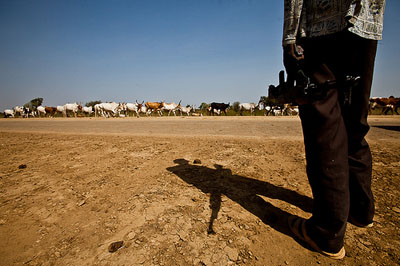
Four days of intense fighting in Abyei region continued into today, in a strong reminder that a political solution to the region’s highly disputed status is urgently needed. Fear of violence spreading has prompted large numbers of residents in Abyei town to begin to leave, according to an Enough source in Abyei.
Like most incidents in Abyei, the details of the fighting—motivations, who and what caused the conflict to spark, and numbers dead—vary widely according to who is talking. Enough sources on the ground received unconfirmed reports from Abyei administration officials that multiple clashes have taken place in areas just north of Abyei town today, including an attack on a southern police post in Maker Abior, a village that saw fighting in early January around the South’s referendum. According to these southern sources, 29 southern police have been killed. AFP quoted southern officials saying at least 70 people were killed and that two Dinka villages, Maker and Wungok, were burned to the ground.
Southern officials claim that the attackers were comprised of members of the Sudanese army and Misseriya militias. Misseriya leaders have also alleged that southern police contingents, deployed to Abyei as part of what is supposed to be a neutral security force, are actually made up of southern soldiers. Under the Comprehensive Peace Agreement, neither the northern or southern armies are supposed to have troops in the area outside of a joint North-South force that is meant to provide security.
Tensions and anxieties in Abyei town are high, according to Enough’s source on the ground. Fears have been fueled by rumors that a battalion of the Sudanese army is moving toward the Abyei area. Abyei residents are also reportedly receiving calls from Misseriya in the North, warning them to leave town.
The motivations for this bout of violence are unclear. The most recent reconciliation efforts on the ground between Misseriya and the Dinka communities appear to have faltered. The displacement of populations as a means to claim land was a well-documented strategy used by the Sudanese government during the civil war.
One fact has long been clear: Tensions in Abyei are high, and there are myriad factors that can lead to conflict, among them the many armed actors in the region, the loss of trust between communities on the ground, mounting frustration at national politics, and an increase in movements of people. So far, violent incidents have been contained within Abyei’s borders.
In the coming days, the international community needs to ascertain the facts on the ground, and take swift steps toward ending the violence. What is urgently needed is a political resolution to Abyei’s status, without which, future conflict in the region will almost certainly arise even after this particular conflagration is put down.
A tentative deadline of the end of March has been put forward for negotiations over Abyei to come to a close. But there is a strong tendency among Sudanese leaders to miss deadlines or delay until the last minute – which is where African Union mediation, backed by robust U.S. engagement, comes in. Sudanese leaders and international mediators have punted the question of Abyei long enough. Without a resolution, the stability of two new states may very well be compromised.

